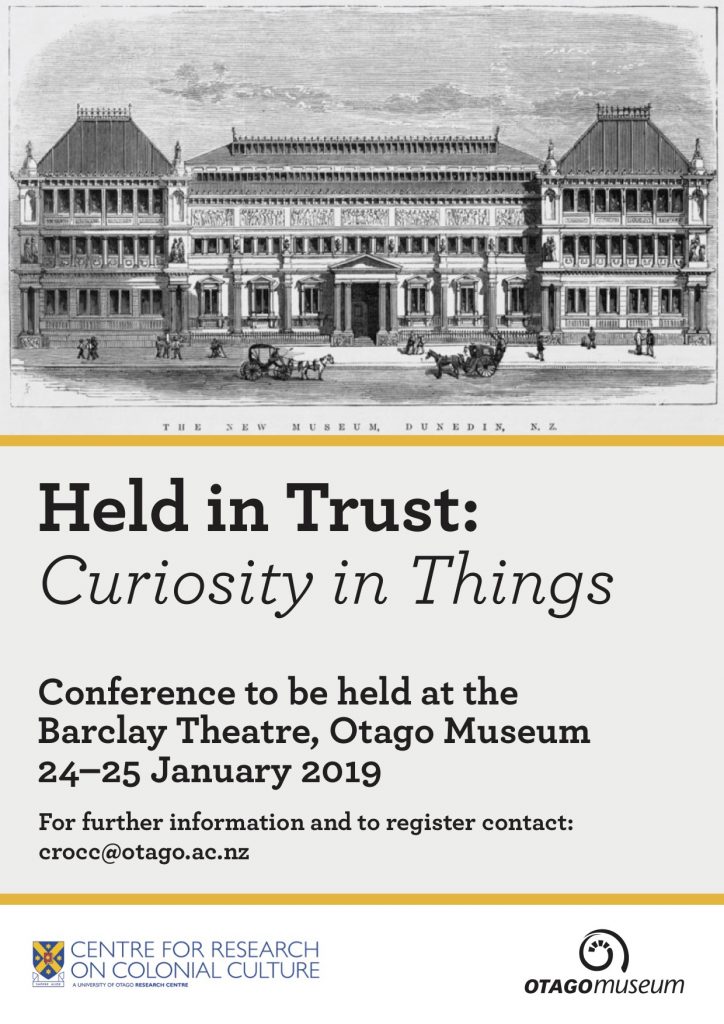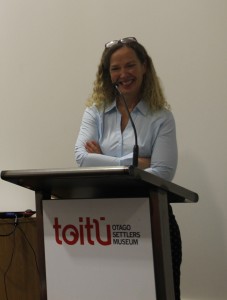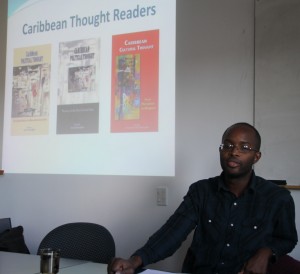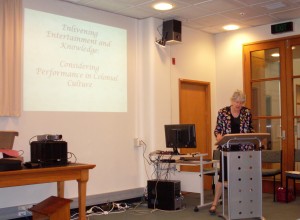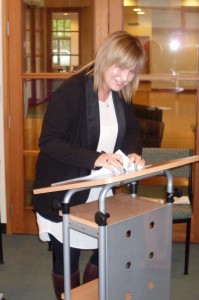Held in Trust: Curiosity in Things Conference
Just a reminder to register for the Held in Trust: Curiosity in Things Conference to be held at Otago Museum on 24-25 January 2019. This is a FREE event, so please do register your interest in attending by contacting us at crocc@otago.ac.nz
CfP: New Histories of Pacific Whaling
Call for Papers
New Histories of Pacific Whaling
An International Symposium co-sponsored by the Rachel Carson Center, the University of Oregon and the Centre for Research on Colonial Culture, University of Otago, New Zealand
University of Hawai’i – Mānoa, June 29 – 30, 2018
Emerging historical scholarship is upending older work on whaling and showcasing it as an ideal medium with which to investigate human relationships with the oceans and with each other. Whales offer investigative bridgeheads into the cultural histories of non-human species, the hidden histories of energy economies, and the complicated histories of cross-cultural contact. Whale histories are demonstrating to environmental historians the various scales, including oceanic scales, with which they can work and are challenging them to consider new forms of evidence and new tools of interpretation. This international symposium aims to bring together the excellent, scholarship integrating the history of Pacific whaling with environmental and cross-cultural history. We seek participants from around the world to convene next year at Honolulu, the center of the Pacific whaling industry. We especially welcome scholarship that engages Pacific and environmental history and examines the crucial linkages between whaling, animal histories, indigenous histories, capitalism, diplomacy, environmental change, and globalization.
Participants will be expected to pre-circulate drafts of works in progress in advance of the symposium. Selected papers will be published as a special issue of Rachel Carson Center’s Perspectives. Travel and lodging costs will be covered by the seminar sponsors.
For those interested, please email 250-word paper proposals along with a short cv to the symposium conveners by September 1, 2017
Ryan Tucker Jones, University of Oregon rtj@uoregon.edu
Angela Wanhalla, University of Otago, angela.wanhalla@otago.ac.nz
Dunedin’s Genetic Inheritance and Caribbean Cultural Thought.
The Centre has recently hosted two riveting research-based talks.
The first, on Sunday 10 May, was part of the Centre’s ongoing project, Global Dunedin. Professor Lisa Matisoo-Smith, a biological anthropologist from Genetics Otago gave a public lecture at Toitū: Otago Settlers Museum, “Who do you think you are – Dunedin?”
Lisa discussed the genetic ancestry of Dunedin’s population based on the testing of randomly selected DNA samples. This research is part of the “Africa to Aotearoa” project, in which Lisa looks at the deep ancestry of New Zealanders, which in turn is part of a wider international study, the Genographic project, funded in part by National Geographic. While one might suspect that Dunedin’s genetic make-up is essentially homogenous from its Scottish heritage, the research shows just how diverse Dunedin’s population is, in line with other major cities in New Zealand.
On Thursday, May 15 visiting scholar Dr Aaron Kamugisha gave a CRoCC seminar, “The Caribbean’s Intellectual History through Culture”. Aaron discussed the global impact of Caribbean theorist’s, particularly CLR James, amongst others, on the development and dissemination of anti-colonial thought and intellectual traditions. He placed these theorists in the context of the development of two threads of intellectual history: Caribbean Studies and Caribbean Cultural Studies, but argued that these thinkers ought to be understood in term of Caribbean radical thought.
Caribbean Intellectual History
On Thursday 14 May the Centre for Research on Colonial Culture is running a research seminar. The speaker is Dr Aaron Kamugisha who teaches cultural studies, the history of political thought & intellectual history at the University of the West Indies, Cave Hill. His recent publications include Caribbean Political Thought: The Colonial State to Caribbean Internationalisms (Kingston: Ian Randle, 2013), an edited collection Caribbean Political Thought: Theories of the Post-Colonial State (Kingston: Ian Randle, 2013); and another collection co-edited with Yanique Hume, Caribbean Cultural Thought: From Plantation to Diaspora (Kingston: Ian Randle, 2013).
Dr. Kamugisha’s talk is titled “The Caribbean’s Intellectual History Through Culture” and will be held at 1pm in 2N8 in the History Department’s Seminar Room.
All are welcome.
Mary Boyd Prize
Congratulations to Tony Ballantyne of CRoCC in winning the inaugural Mary Boyd Prize for the best published history essay. The judges were Margaret Tennant (Massey) and Felicity Barnes (Auckland) and was awarded at the NZHA conference dinner at Otākou Marae on Thursday 21 November for his essay “On Space, Place and Mobililty in Nineteenth-Century New Zealand” in the New Zealand Journal of History April 2011.
Considering Performance in Colonial Culture
A special issue of the Journal of New Zealand Studies on Colonial Performance has just been released. It features essays by a number of the Centre’s members, notably Tom Brooking and John Stenhouse, and the volume was edited by Barbara Brookes. Congratulations to all involved in creating this special issue!
James Cowan Symposium
A reminder that abstracts for the James Cowan Symposium (to be held in early 2014), co-hosted by the Centre for Research on Colonial Culture and the Alexander Turnbull Library, are due by 30 September. More details about the event can be accessed here: Cowan Symposium ePoster
Cowan Symposium Call-for-Papers
Call for Papers
New Perspectives on James Cowan
A One-Day Symposium
Centre for Research on Colonial Culture and the Alexander Turnbull Library
National Library, Wellington, 21 February 2014
James Cowan is best known for his official history of the New Zealand Wars, but his significance for the production and circulation of knowledge about Māori in the late colonial era covered a broad range of subjects. Alan Mulgan wrote after Cowan’s death in 1943 that more than anyone else, he had ‘shown us how to think as New Zealanders’. Mulgan signaled here not only Cowan’s prolific writing, but also his cross-cultural engagement from the 1890s to the 1940s. He was himself a figure of the type he so admired: the cultural go-between. Although his work often purveys the racial ideologies of his time, Cowan’s early use of oral historical methods, and familiarity with a wide range of Māori informants, effected the transition to print of much that would not otherwise have been circulated in Pākehā contexts, or recorded in print.
Cowan’s reputation has fluctuated in response to shifts in cultural politics, writing and historiography. His work began to attract contemporary scholarly attention with an article by Chris Hilliard in NZJH in 1997. Stories of the New Zealand Bush has been republished recently with a critical introduction by Alex Calder. The Adventures of Kimble Bent was read on National Radio in 2011, and re-written as a graphic novel, and film-makers have drawn on his work over decades. Some dimensions of Cowan’s work invite closer study: his significance for iwi history, his photographic collection, and the personal life of this particularly colonial figure, for example, would repay investigation.
For this one-day event, we invite papers which evaluate Cowan’s contribution to colonial encounter and colonial memory from a wide range of perspectives.
Please send abstracts (up to 250 words) and a bio (up to 100 words) in a Word attachment, by 30 September 2013.
Abstracts and enquiries should be sent to: cowan.symposium@otago.ac.nz
Further information about the symposium will be forthcoming.
Associate Professor Chris Hilliard, University of Sydney, will give a concluding commentary.
Convenors
Annabel Cooper (Centre for Research on Colonial Culture, U of Otago)
Ariana Tikao (Research Librarian, Māori, Alexander Turnbull Library),
Paper Work
Professor Tony Ballantyne (Otago) and Associate Professor Craig Robertson (Northeastern University), who is spending his sabbatical in the Department of History and Art History, have organised two events that explore the history and meaning of paper work.
On Thursday evening 23 May (5.30 Burns 2) the distinguished media historian Professor Lisa Gitelman (NYU) will deliver a public lecture entitled the ‘The Social Life of Paper’.
On Friday 24 May there will be a one day research symposium at the Hocken Collections on ‘Paper Work: The Materials and Practices of Modern Information Cultures’. The programme is below. Please email Tony if you would like to attend: tony.ballantyne@otago.ac.nz
Paper Work: The Materials and Practices of Modern Information Cultures
9.20am: Welcome
9.30-11.45am
Barbara Brookes, Committed by Paper: Incoherence and Accountability in the Seacliff Asylum Files
Jane McCabe, The Kalimpong Files: Private and Confidential
1.30-3.00pm
Stephen Robertson (University of Sydney), Private Detectives and the Paper Work of Surveillance in the US, 1855-1939
Craig Robertson (Northeastern University), Handling Information: File Clerks, Efficiency, and the Emergence of the Modern Office
3.15-4.45pm
Tim Rowse (University of Western Sydney), Tabulating Indigenous Populations: Colonial Knowledge in Two Dimensions
Tony Ballantyne, Paper and the Work of Empire: Bureaucracy and British Colonialism
Presenters Perform
A very successful symposium on Colonial Performance was held at the Hocken Collections Seminar Room on Monday, November 19th. Presenters gave illuminating talks on a wide range of colonial performances from Irish drama in Dunedin, to Maori performers in Manhattan, to the theatre of the Dunedin police court, among other topics.
Barbara Brookes, who convened the day-long symposium, kicked off the event with a discussion of touring medical lecturer Dr. Anna Longshore Potts.
Barbara was followed by two presentations on the theatre scene in Dunedin. Lisa Warrington invited us into Dunedin’s first theatre, a converted horse stable, and Peter Kuch drew attention to the importance of Irish drama in the development of Dunedin theatre during the 1860s. Kirstine Moffatt entertained us all with stories about the amateur pianist, who appeared in private homes, at concerts held in church halls, and barns.
Unlike Richard John Seddon, who spoke for hours at a time, Tom Brooking used a mere 20 minutes to describe the role of performance in colonial politics. At the same time he revealed some of the popular prejudices against Seddon in New Zealand’s historiography. Rosi Crane drew upon her doctoral research in the history of science to show how university professors used their role as public intellectuals to advance scientific understanding, for example in the field of evolution.
Bronwyn Dalley gave a vivid account of the many re-inventions of ‘urban investigator’, free-thinker and spiritualist, Lotti Wilmott in 1880s Christchurch. The tensions between ethnographic ideas about race and “primitive” societies were put to the test by the appearance of Maori performers at New York City’s Hippodrome in 1909-10. Marianne Schultz, from Auckland University, also explored how the leaders of the US suffragette movement used the case of Maori women, who had the right to vote, in their own campaigns for enfranchisement. Michelle Willyams also looked at Maori performers and performance, highlighting the hybrid nature of the musical repertoire developed by Reverend Seamer’s Waiata Maori Choir in the 1920s and 1930s.
University of Otago MA student Fabia Fox walked us through the streets of nineteenth-century Dunedin, and into the backyards of homes in the ‘Devil’s Half-Acre’ famous for its criminal underclass. Their exploits were often played out in the Dunedin police court, and relayed to a voyeuristic reading public through the column of the court reporter. In contrast, John Stenhouse embellished his talk on the Rev. Rutherford Waddell with his own rendition of excerpts from his famous sermon on the sin of cheapness. Prof. Lyn Tribble (English) eloquently wrapped up the day, drawing together the various themes into what she described as an ecology of performance.

